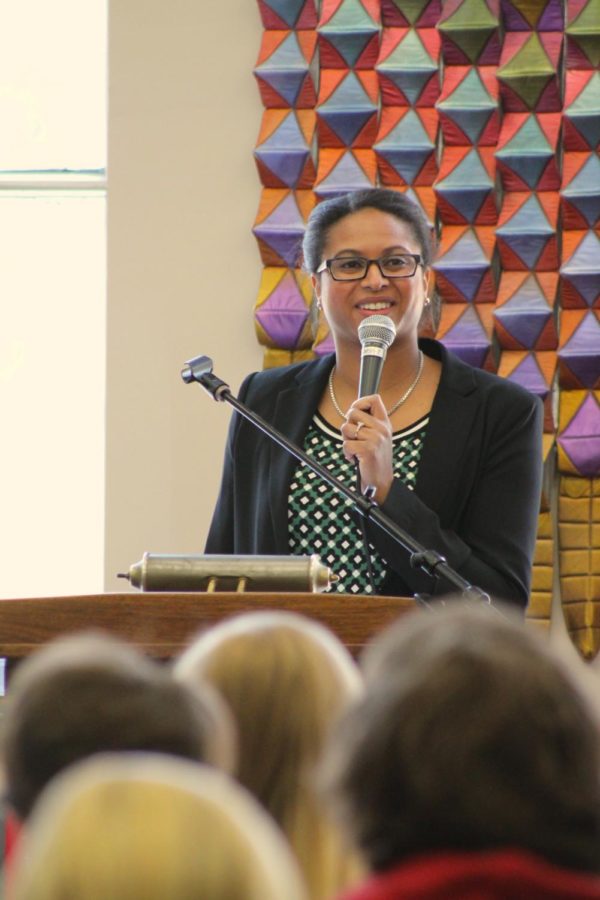McLaughlin: Iowa Civil Rights Commission focuses too much on the past
Richard Martinez/Iowa State Daily
Brooke Miller, member of the Iowa Civil Rights Commission, spoke about the fundamental legal definitions of discrimination, equality and other civil rights issues as part of the First Amendment Day recognition hosted by the Greenlee School of Journalism and Communication.
April 23, 2014
April 14 marked the start of celebrations for the 12th annual First Amendment Day celebrated by the Greenlee School of Journalism and Communications. First Amendment Day, which was April 17, is celebrated to uphold and champion the five freedoms bestowed on all U.S. citizens by the Constitution.
To kick off the week leading up to First Amendment Day, the Greenlee School had the Iowa Civil Rights Commission lead a discussion about Iowa’s progression of civil rights.
The first speaker from the commission, Brooke Miller, discussed Iowa’s history in the African-American civil rights movement from the state’s territorial days to present day — a focus which seems unnecessary when compared to the other topics covered at the discussion about modern African-American civil rights issues.
Miller mentioned Iowa’s Organic Act, which only gave white men the power to vote and hold office. Miller continued her speech by pointing out the steady improvements that Iowa had made toward equality and civil rights. Miller also makes note of Edna Griffin, an African-American activist who became known as the “Rosa Parks of Iowa” when she fought and sued Katz Drugstore in Des Moines after being refused services by owner Maurice Katz. The lawsuit sparked by the 1948 incident — seven years before Rosa Parks’ incident — resulted in Griffin being awarded a single dollar.
Miller’s speech only focused on historical issues of the civil rights movement despite there still being issues for many black Americans in the country, including Iowa.
The second speaker was Liz Johnson, a civil rights specialist for the Iowa Civil Rights Commission. She changed the topic’s focus onto more relevant issues concerning the lesbian, gay, bisexual, transgender and queer community and the challenges that they face. The LGBTQ community as a whole is still mistreated in many facets of American life, and it’s an issue that needs to be addressed.
Johnson started with the definition of education discrimination. She then presented a statistic showing Iowa as above the national average in physical and verbal harassment against the LGBTQ community plus a lack of faculty intervention in harassment cases in school. She continued on by explaining the steps that LGBTQ community members have to go through to receive compensation after experiencing employment discrimination.
The final speaker from the Iowa Civil Rights Commission was Housing Investigations Supervisor Don Grove. He touched on the topic of equal and fair housing. He explained how everyone is protected under the law and how the commission investigates cases that break the state and federal laws.
After the presentations, Miller said, “I think Iowa was more progressive than other states. The people of Iowa should be proud and should be telling these stories.”
History is important for everybody to learn, especially in such circumstances as racism and equality, and it’s great to take pride in our state’s past progress. There’s nothing wrong with state pride.
That said, wouldn’t it be more pertinent to discuss the racial inequality that still exists in our country today? African-Americans and many other minorities still face disparity in poverty, homeownership and incarceration rates compared to white Americans. Minorities also find themselves disadvantaged in the public school system in regards to access to educational resources and treatment compared to white children.
Despite white people making up 92.8 percent of Iowa’s population, it’s still a problem that we have to address. Many of the problems stated above are problems that minorities have to face here in Iowa. Any nonwhites who live in Iowa may have even harder times finding opportunities and avoiding poverty with such a small population of minorities living in the state.
Growing up in a town with roughly 2,000 people with many smaller towns surrounding the area, I’ve experience bits and pieces of racism firsthand. Many times, I’ve heard the N-word thrown around like it was a plain, ordinary term to use for any occasion. Since there were virtually no black people living in the area, not much is done about it among the youth.
The Iowa Civil Rights Commission did do a good job addressing the LGBTQ problems that are flaring up in the state. The LGBTQ community is a key part of finding equality in America. That isn’t the only obstacle that needs to be resolved. Equality shouldn’t be focused on one group alone — each group deserves its fair share of recognition. Pointing out how good of a job in regards to civil rights was done in the past isn’t going to change the inequality that occurs today.







